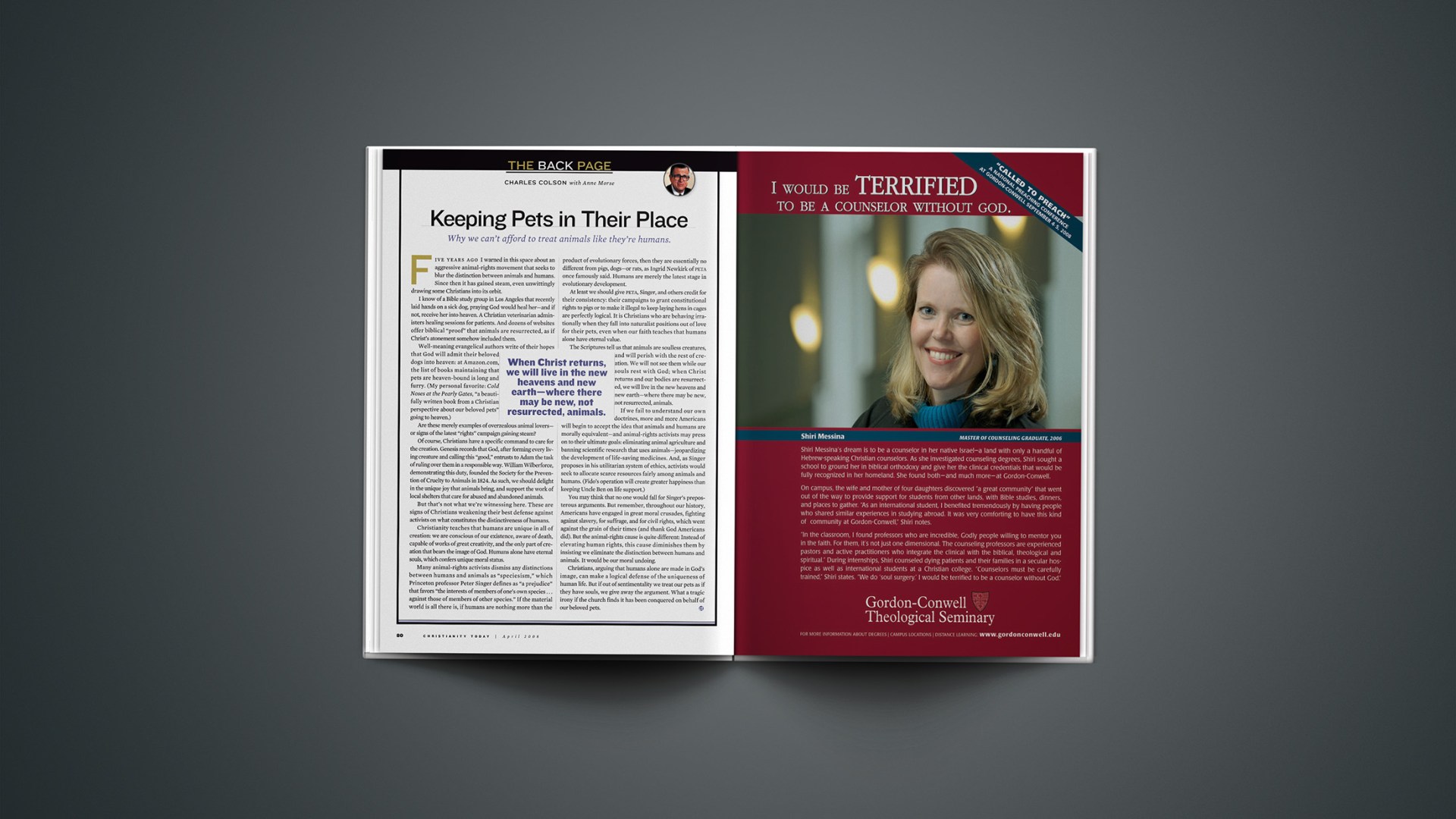Five years ago I warned in this space about an aggressive animal-rights movement that seeks to blur the distinction between animals and humans. Since then it has gained steam, even unwittingly drawing some Christians into its orbit.
I know of a Bible study group in Los Angeles that recently laid hands on a sick dog, praying God would heal her—and if not, receive her into heaven. A Christian veterinarian administers healing sessions for patients. And dozens of websites offer biblical “proof” that animals are resurrected, as if Christ’s atonement somehow included them.
Well-meaning evangelical authors write of their hopes that God will admit their beloved dogs into heaven: at Amazon.com, the list of books maintaining that pets are heaven-bound is long and furry. (My personal favorite: Cold Noses at the Pearly Gates, “a beautifully written book from a Christian perspective about our beloved pets” going to heaven.)
Are these merely examples of overzealous animal lovers—or signs of the latest “rights” campaign gaining steam?
Of course, Christians have a specific command to care for the creation. Genesis records that God, after forming every living creature and calling this “good,” entrusts to Adam the task of ruling over them in a responsible way. William Wilberforce, demonstrating this duty, founded the Society for the Prevention of Cruelty to Animals in 1824. As such, we should delight in the unique joy that animals bring, and support the work of local shelters that care for abused and abandoned animals.
But that’s not what we’re witnessing here. These are signs of Christians weakening their best defense against activists on what constitutes the distinctiveness of humans.
Christianity teaches that humans are unique in all of creation: we are conscious of our existence, aware of death, capable of works of great creativity, and the only part of creation that bears the image of God. Humans alone have eternal souls, which confers unique moral status.
Many animal-rights activists dismiss any distinctions between humans and animals as “speciesism,” which Princeton professor Peter Singer defines as “a prejudice” that favors “the interests of members of one’s own species … against those of members of other species.” If the material world is all there is, if humans are nothing more than the product of evolutionary forces, then they are essentially no different from pigs, dogs—or rats, as Ingrid Newkirk of PETA once famously said. Humans are merely the latest stage in evolutionary development.
At least we should give PETA, Singer, and others credit for their consistency: their campaigns to grant constitutional rights to pigs or to make it illegal to keep laying hens in cages are perfectly logical. It is Christians who are behaving irrationally when they fall into naturalist positions out of love for their pets, even when our faith teaches that humans alone have eternal value.
The Scriptures tell us that animals are soulless creatures, and will perish with the rest of creation. We will not see them while our souls rest with God; when Christ returns and our bodies are resurrected, we will live in the new heavens and new earth—where there may be new, not resurrected, animals.
If we fail to understand our own doctrines, more and more Americans will begin to accept the idea that animals and humans are morally equivalent—and animal-rights activists may press on to their ultimate goals: eliminating animal agriculture and banning scientific research that uses animals—jeopardizing the development of life-saving medicines. And, as Singer proposes in his utilitarian system of ethics, activists would seek to allocate scarce resources fairly among animals and humans. (Fido’s operation will create greater happiness than keeping Uncle Ben on life support.)
You may think that no one would fall for Singer’s preposterous arguments. But remember, throughout our history, Americans have engaged in great moral crusades, fighting against slavery, for suffrage, and for civil rights, which went against the grain of their times (and thank God Americans did). But the animal-rights cause is quite different: Instead of elevating human rights, this cause diminishes them by insisting we eliminate the distinction between humans and animals. It would be our moral undoing.
Christians, arguing that humans alone are made in God’s image, can make a logical defense of the uniqueness of human life. But if out of sentimentality we treat our pets as if they have souls, we give away the argument. What a tragic irony if the church finds it has been conquered on behalf of our beloved pets.
Copyright © 2008 Christianity Today. Click for reprint information.
Related Elsewhere:
Colson’s previous columns are available on our site.










